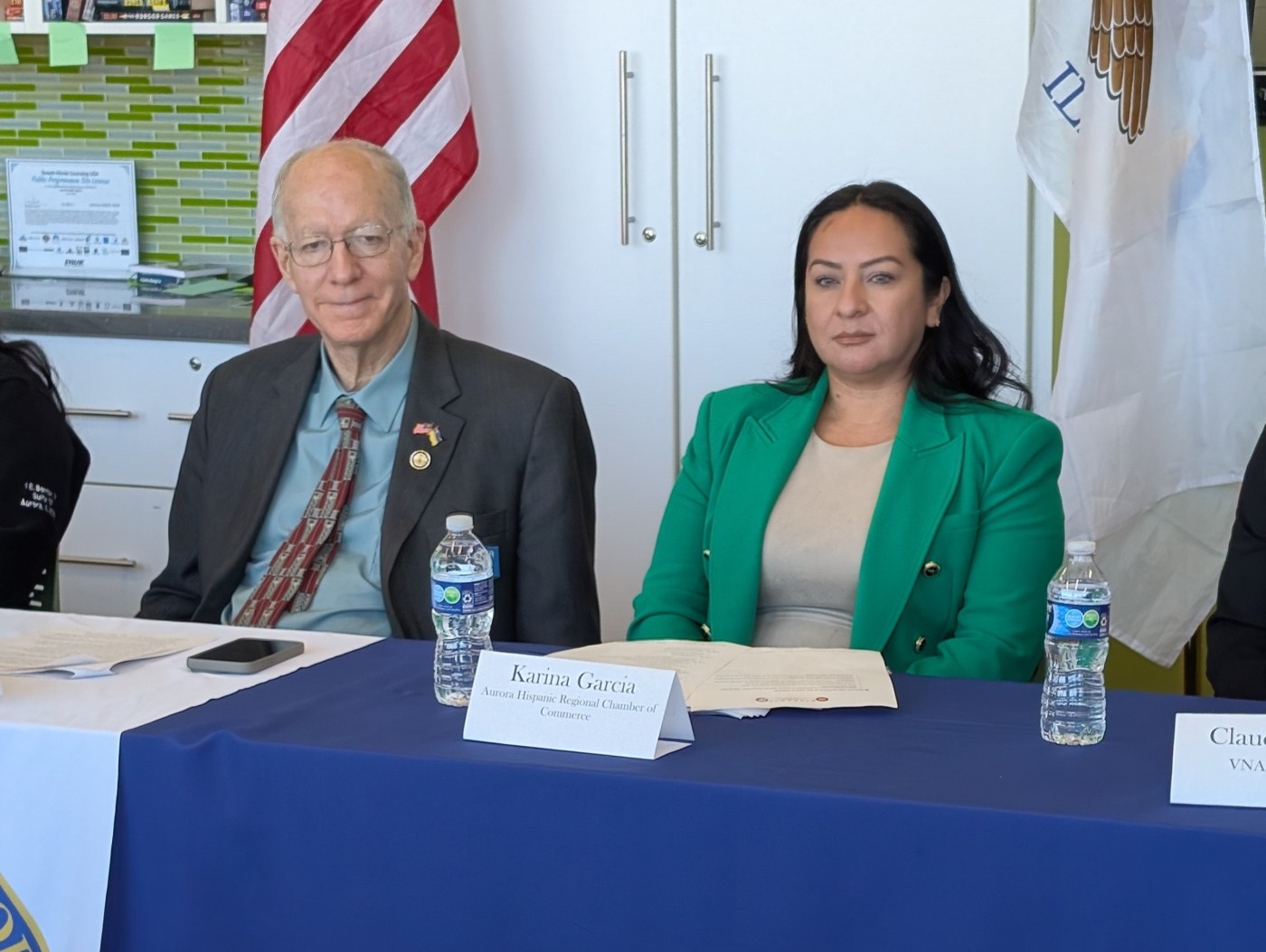When Nancy Martinez was making her business plan for Nide Jardin, a home decor and plant boutique in downtown Aurora, she made Latinos her target market—both because it is her culture and because they are a significant consumer base in this country.
But this month, amid heightened immigration enforcement efforts pushed by the Trump administration, Martinez only saw about half the sales she normally does during the monthly downtown First Fridays event. She is now seeing less sales than when she just sold items at local markets during the COVID-19 pandemic.
That’s what Martinez told U.S. Rep. Bill Foster, D-Naperville, at a roundtable meeting with local Hispanic business owners held at the downtown branch of the Aurora Public Library on Friday. Those who attended the event spoke of challenges their businesses are facing because of recent immigration enforcement actions and asked elected officials for help.
Under the Trump administration, the Department of Homeland Security announced early last month that it had begun a surge of immigration law enforcement in Chicago called “Operation Midway Blitz.” Aurora has also been seeing an increase in federal immigration enforcement agents, who are frequently just called “ICE” after the U.S. Immigration and Customs Enforcement agency.
Two weeks ago, several demonstrations were held in Aurora, including one at City Hall and another that Mayor John Laesch said he joined in, after federal agents were seen across the city. Hispanic business owners said at the meeting on Friday that they have been seeing fewer customers, slow business, and employees who don’t want to come in during the immigration crackdown. People are scared to leave their homes, the business owners said.
When The Beacon-News reached out to the Department of Homeland Security to ask about the effect heightened immigration enforcement efforts are having on local businesses, Assistant Secretary Tricia McLaughlin said in a statement that removing “dangerous criminals from our streets makes it safer for everyone including business owners and their customers.”
The Trump administration has insisted that immigration enforcement efforts are focused on immigrants who are in this country illegally and have a criminal background. And while the Chicago Tribune reported earlier this year that immigration arrests are up under President Donald Trump, including double the rate of those convicted of violent felonies and sex crimes, it also found that there have been nine times as many arrests of immigrants with no known criminal past.
McLaughlin said in her statement that those “who are not here illegally and are not breaking other laws have nothing to fear,” adding that “elected officials choosing to fearmonger by distorting reality are doing a great disservice to our country” and are driving an uptick in assaults on immigration enforcement agents.
However, a recent ProPublica investigation found at least 170 U.S. citizens have been arrested by immigration agents during Trump’s second term.
In early March, The Beacon-News reported that immigrant-owned businesses in Aurora were seeing customers stay home amid fears of ICE arrests. Now, business owners are saying things are getting harder, with a few saying the pandemic might have been better than this.
Gil Velazquez of Aurora’s Los Panchos and El Capitan restaurants said at the roundtable meeting on Friday that his business has been facing problems for about five months, but it has gotten worse “ever since we started having all these agents in the area.” It used to be that his restaurant was about half full during the week, Velazquez said, but now he only sees a couple of tables filled here and there. His restaurants’ customer base is about 80% Hispanic, he said.
“People are scared to come out,” he said. “I can’t force people to come out.”
Aurora is more than 40% Hispanic, compared to 19% in Illinois and just under 30% in Chicago, census data has shown. Aurora’s population was just over 25% foreign-born from 2019-2023, compared to roughly 14% in Illinois and just over 20% in Chicago.
Velazquez said his restaurants are far from the only businesses being impacted by the heightened immigration enforcement. Grocery stores that used to be packed, with no parking to be found, are now lucky to be half full, he said. A lot of the businesses he’s talked to won’t make it by the end of the year without help.
Foster called what’s happening “nothing short of an assault on our families’ safety, peace of mind and their ability to do business.”
“It’s really as far from law and order as you can imagine,” he said. Now is the time for business organizations, like the Aurora Regional Hispanic Chamber of Commerce, to stand up so individual members aren’t targeted, according to Foster.
The Hispanic Chamber helped organize the roundtable meeting, which was also led by the group’s President and CEO Karina Garcia. Garcia asked if Foster could help her organization in sending a letter to the Trump administration outlining their concerns, and Foster agreed.
Others, including Velazquez, also asked Foster if the federal government could provide grants or interest-free loans, like during the COVID-19 pandemic, to help with the situation.
Foster said that Democrats are a minority in Congress at the moment, but one of his staff members said they’d be reaching out to the Small Business Administration to see what kinds of opportunities are available and to the banking community to see how they plan to help small businesses.
Those in attendance also talked about expanded work visas as a way to potentially help the issue, as they would help people stay in the country legally while bringing in revenue for the federal government. Foster suggested that, under the idea, the amount of visas could be a state decision.
Plus, business owners discussed how displaying signs telling federal immigration enforcement agents they are not allowed in without a warrant and similar measures made customers feel safer.
Aurora Alderman Juany Garza, 2nd Ward, also attended the meeting. She said the city was working on potentially banning ICE agents from city property, including parks, as well as marketing efforts for small business.
Martinez, of Nide Jardin, had another idea for how to help Hispanic businesses that are struggling: get people who aren’t threatened by the uptick of immigration enforcement into these businesses and the neighborhoods they are located in.
“We need our allies, or those that are saying that are allies, to come to our neighborhoods and buy from us,” she said.
[email protected]
https://www.chicagotribune.com/2025/10/25/hispanic-business-owners-in-aurora-area-ask-for-help-amid-heightened-immigration-enforcement-people-are-scared-to-come-out/



